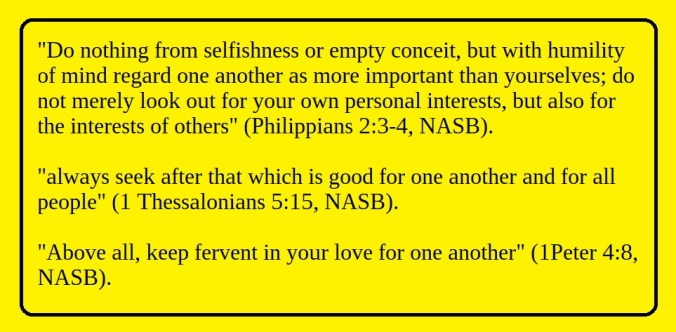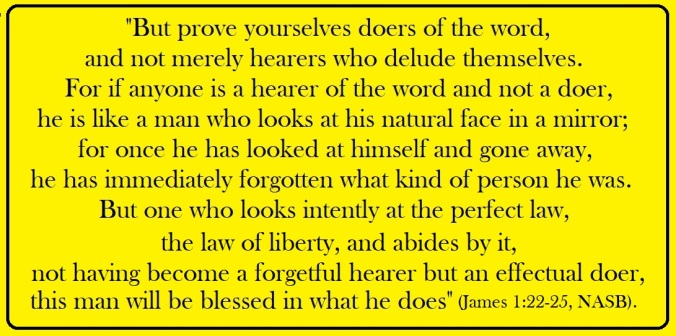“Go therefore and make disciples of all the nations…teaching them to observe all that I commanded you; and lo, I am with you always, even to the end of the age” (Matthew 28:19-20, NASB).
——————–
Contents:
1) When We Don’t Know Why (Doy Moyer)
2) Respect for the Name of God (Gary Henry)
3) News & Notes
——————–

-1-
When We Don’t Know Why
Doy Moyer
We have so much difficulty grasping why bad things happen in this world. How can God be in control when we see so much heartache, sickness, and evil? This has long been a point of doubt for many. Books like Job, Ecclesiastes, Habakkuk, and many Psalms grapple with this problem.
The reality of evil and heartache in this world need not sink our faith. The fact that Scripture devotes so much space to the problem of evil, and indeed is a major theme of Scripture, is evidence that its existence in no way impugns the integrity and purposes of God. Scripture is a testimony of God’s response to the problem that includes Jesus dying for our sins so that we can be reconciled to Him.
Times like these require that we make a decision about whom we will trust. Trust will be tested the most when we are required to give up the most. Think about Abraham sacrificing Isaac and trusting that God knew what He was doing, even to the point of believing that God would raise Isaac from the dead (Gen 22:1-14; Heb 11:17). When Abraham was asked to give up the most, he trusted God all the more.
When we don’t know why, we must trust that we know the One who does know why and that He always has good reason to act, to allow, and to arbitrate between the various events and issues that we face in this world. Since we are to walk by faith not by sight (2 Cor 5:7), and since faith undergirds our hope (Heb 11:1), then we ought to remember that faith is the demonstration of our trust in the reality of what we cannot see. We don’t see what is going on “behind the scenes,” but we know the One who owns and manages the stage.
God is all-knowing, all-powerful, all-wise, all-understanding, and all-loving. None of that changes when we do not understand something. Our lack of knowledge about greater matters of reality should never be a reason to turn from God; rather this is all the more reason to turn to and trust God.
“When I am afraid, I put my trust in you” (Psalm 56:3).
Trusting God in a world that is full of “bad things” requires that we be prepared both spiritually and physically. Spiritually, we prepare our minds for action and seek to obey His will and to be holy as He is holy (1 Pet 1:13-16). Without spiritual preparation, we will be open to the schemes of the evil one (Eph 6:10-18). Physically, we prepare because “your body is a temple of the Holy Spirit within you, whom you have from God” … and “you are not your own, for you were bought with a price. So glorify God in your body” (1 Cor 6:19-20).
Spiritual interests are always more important than what may happen to our physical bodies (not that our bodies are unimportant). Recall that when Jesus had healed the man who had been paralyzed for thirty-eight years, He later found him in the temple and told him, “See, you are well! Sin no more, that nothing worse may happen to you” (John 5:14). Sin will be more destructive to us, body and soul, than any particular physical illness. One can be physically ill yet spiritually robust, and one can be physically in good shape yet spiritually anemic. The former condition would be far better than the latter. After all, if we are reconciled with God, we trust that the resurrection is coming.
On the other side of the spectrum is the problem of panic. This is generally some kind of sudden or overwhelming fear and can lead to irrational behaviors. Sometimes panic results in an outbreak with larger groups of people acting irrationally at the same time. This type of fear can be very destructive, and not only with physical properties. Our peace of mind is ruined. There is no joy in a mind full of fear. Think about the difference of panic and preparation:
Panic is irrational.
Preparation is rational.
Panic is based on fear.
Preparation is based on trust.
Panic loses sight of the needs of others.
Preparation cares for the needs of others.
Panic forgets God is in control.
Preparation submits to God’s control.
The child of God is called upon to trust God. God has given us tools by which we may overcome our anxieties and fears. Paul put it this way:
“Rejoice in the Lord always; again I will say, rejoice. Let your reasonableness be known to everyone. The Lord is at hand; do not be anxious about anything, but in everything by prayer and supplication with thanksgiving let your requests be made known to God. And the peace of God, which surpasses all understanding, will guard your hearts and your minds in Christ Jesus” (Phil 4:5-7).
As we think on things that are excellent (v. 8), determine to practice what is right (v. 9), show our care for others (v. 10), and learn to be content in our circumstances (vv. 11-12), we know that Christ will strengthen us (v. 13).
When we don’t know why, trust the only One who does know.
— via the Vestavia church of Christ, March 22, 2020
——————–

-2-
Respect for the Name of God
Gary Henry
“And you shall not swear by My name falsely, nor shall you profane the name of your God; I am the Lord” (Leviticus 19:12).
ONE EVIDENCE OF HOW LITTLE REGARD WE HAVE FOR GOD IS THE FLIPPANT WAY IN WHICH WE SOMETIMES USE HIS NAME. It is possible, no doubt, to be scrupulous in the use of God’s name and still not have any reverence for Him in our hearts. But in today’s meditation, we want to focus on the inside-out problem: the problem of the person who has no inward respect for God and that lack of respect shows up in the person’s outward speech. There are basically three ways we may disrespect God and His name.
Swearing. To swear is to invoke God as the guarantee that we’re going to do as we say. For instance, the person who says, “This is what I’m going to do, by God” is swearing. But Jesus taught that our statements ought not to require any oath to back them up. “Let your ‘Yes’ be ‘Yes,’ and your ‘No,’ ‘No.’ For whatever is more than these is from the evil one” (Matthew 5:37).
Profanity. Profane speech is that which makes common or crude use of words that should be held as sacred and used only with great reverence. It’s not uncommon anymore to hear the words God and Jesus Christ thrown around so casually one wonders if the speakers even realize whose names they are using.
Cursing. When a person curses, he calls down God’s wrath upon someone, verbally wishing them harm. “Damn you” is shorthand for “I hope God will damn your soul to hell.” Even thinking this about someone is serious, but speaking it out loud — using God’s name to vent our anger on others — is a monstrous evil. It is no light matter to wish the loss of someone’s soul.
Why are these things so serious? Might we not consider them harmless foibles, less dangerous than sins that actually hurt other people? Well, the problem has to do with the heart. Crude words, and certainly irreverent ones, are almost always symptomatic of a heart that is turned away from God. So Jesus said, “By your words you will be justified, and by your words you will be condemned” (Matthew 12:37). So the next time you feel like “cussing,” check your heart. Where is your spiritual father, above or below? Does your speech show that you’re a humble worshiper of God?
“To curse is to pray to the devil” (German Proverb).
— Via WordPoints, March 29
——————–
-3-
News & Notes
As we continue with the need for social distancing to help stem the tide of the coronavirus, let us be keeping each other in prayer and also pray that all will soon be back to normal
Also, Jonathan Abbott’s mother will have a port installed at the Memorial Satilla tomorrow and then begin chemo on Tuesday in Jesup. She is having this to treat her Amyloidosis.
Rex Hadley returned home last Tuesday, after his recent hospital stay. For a few days, he had been weak, but is doing better as of yesterday. It turned out that he did have pneumonia — but just in the one lung. On the day he left, they did an echocardiogram, but cancelled his stress test. He has not yet heard the results. They have given him some new medication, and he will soon be having a follow-up with his cardiologist.
Ginger Ann Montero is healing from her respiratory illness.
Bud Montero has not yet been told when his treatments will begin.
Ann Vandevander is still about the same with her condition.
Rick Cuthbertson has been having difficulty with his cancer treatments.
John Bladen is still not able to walk without support, and his left arm is paralyzed with some feeling at only the tip of his fingers. He had been in rehab for a month, but now continues therapy on his own.
A.J. & Pat Joyner both have health issues.
Joyce Rittenhouse is on medication for a kidney stone.
Shirley Davis still has some trouble with her right leg and back, and has had a kidney infection for about a month. It still hurts when she uses her right shoulder and arm. She would like our prayers because she loves us all. For the last two years, she and her sister Vivian talk on the phone about 2 hours every night, and some of each call is in reading the Bible to each other. Vivian was doing that for Shirley when Shirley was not able to see well enough to read; but now her eyes have improved. So they both read to each other.
Let us also remember the following in prayer: Andy Berendt, Jim Lively, Bud Montero, Frankie Hadley, John and Myrna Jordan, Kelly Stoneheart, the Medlock family, Kim Rowell, Sandra Goodrich, and Kerry Williams.
——————–
The Steps That Lead to Eternal Salvation
1) Hear the gospel, for that is how faith comes (Rom. 10:17; John 20:30-31).
2) Believe in the deity of Jesus Christ (John 8:24; John 3:18).
3) Repent of sins (Luke 13:5; Acts 17:30).
4) Confess faith in Christ (Rom. 10:9-10; Acts 8:36-38).
5) Be baptized in water for the remission of sins (Mark 16:16; Acts 2:38; 22:16; Rom. 6:3-4; Gal. 3:26-27; 1 Pet. 3:21).
6) Continue in the faith, living for the Lord; for, if not, salvation can be lost (Heb. 10:36-39; Rev. 2:10; 2 Pet. 2:20-22).
——————–
Tebeau Street
CHURCH OF CHRIST
1402 Tebeau Street, Waycross, GA 31501
Sunday services:9:00 a.m. (Bible class); 10 a.m. & 5 p.m. (worship)
Wednesday: 7 p.m. (Bible class)
evangelist/editor: Tom Edwards (912) 281-9917
Tom@ThomasTEdwards.com
http://thomastedwards.com/go (Older version of Gospel Observer website without pictures, but back to March 1990)
http://tebeaustreetchurchofchrist.org/
http://ThomasTEdwards.com/audioser.html (audio sermons)






